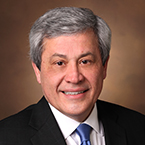
An international leader in the field of breast cancer research, Dr. Arteaga has contributed to the understanding of breast cancer initiation, progression, and metastasis by identifying and characterizing key molecular pathways dysregulated in this disease. He was the first to report the role of IGF-I receptors and transforming growth factor – (TGF-β) in breast cancer and their use as therapeutic targets. He demonstrated that TGF-β, in addition to contributing to breast carcinogenesis, is also capable of driving epithelial to mesenchymal transition, establishment of metastasis, expansion of cancer stem cells, and resistance to chemotherapy. These observations have been significant for the development of molecularly targeted drugs designed to inhibit these signaling pathways. He also reported one of the first studies describing the synergistic effect of chemotherapy with anti-HER2 antibodies, a finding that contributed to the clinical development of trastuzumab for the treatment of patients with HER2-overexpressing breast cancer.
Dr. Arteaga discovered that several cellular perturbations are sufficient to confer resistance to therapies targeted to the ErbB family of receptors, such as HER2 (ErbB2), known to be amplified in 20% of all breast cancers. These alterations include the induction of HER3 (ErbB3), overexpression of ErbB receptor ligands, and loss of phosphatase and tensin homolog (PTEN). Subsequently, he discovered the role of aberrant activation of phosphoinositide 3-kinase (PI3K) on escape from antiestrogen therapy in patients with hormone receptor positive breast cancer.
His ongoing translational research efforts are focused on presurgical and neoadjuvant trials to discover biomarkers that inform patient selection in clinical trials and also to discover mechanisms of drug resistance. These studies include neoadjuvant trials with endocrine therapy and signaling inhibitors for the identification of pharmacodynamic and predictive biomarkers to be used to optimize drug development and genotype-specific treatments for cancer patients.
Career Highlights
2015 Prize for Scientific Excellence in Medicine, American-Italian Cancer Foundation
2014-2015 President, AACR
2014 Grant W. Liddle Award, Vanderbilt University
2013 Elected Fellow, American Association for the Advancement of Science
2011 Brinker Award for Scientific Distinction in Basic Science, Susan G. Komen Foundation
2009 Gianni Bonadonna Award, American Society of Clinical Oncology
2007-2017 American Cancer Society Clinical Research Professor
2005-2013 Deputy Editor, Clinical Cancer Research
2005 Elected Member, Association of American Physicians
2004-2007 Board of Directors, AACR
2003 AACR-Richard & Hinda Rosenthal Award
1999-2004 Board of Scientific Counselors, National Cancer Institute
1998 Elected Member, American Society for Clinical Investigation
1995-2000 Clinical Investigator Award, U.S. Department of Veteran Affairs
1980 MD, University of Guayaquil, Ecuador